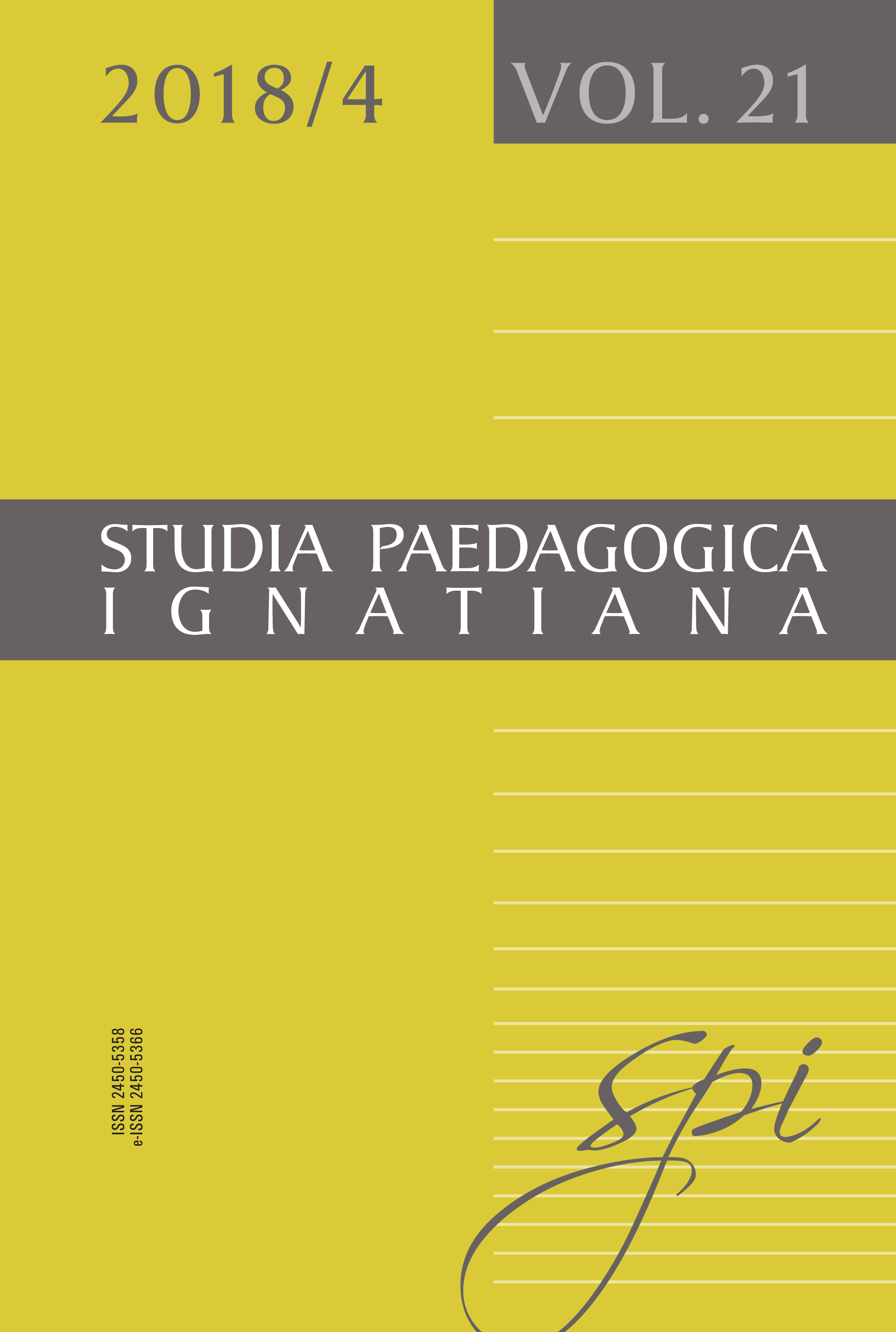Moralne korelaty nastawień wobec pracy kandydatów na nauczycieli-wychowawców
DOI:
https://doi.org/10.12775/SPI.2018.4.007Słowa kluczowe
nastawienia wobec pracy, wartości, uczucia moralne, studenci pedagogiki, chaos aksjonormatywnyAbstrakt
Celem artykułu jest empiryczna charakterystyka nastawień wobec pracy przyszłych nauczycieli-wychowawców oraz moralnych korelatów tych nastawień. Badania przeprowadzono w okresie od grudnia 2017 do lutego 2018 roku w grupie 227 studentów pedagogiki Uniwersytetu Szczecińskiego. Sformułowano następujący problem badawczy: Czy istnieje związek pomiędzy nastawieniem wobec pracy a wartościami i uczuciami moralnymi studentów pedagogiki? Przyjęto hipotezę; że zachodzi istotny statystycznie związek pomiędzy nastawieniem wobec pracy a wartościami i uczuciami moralnymi badanych osób. Obliczenia statystyczne wykonane zostały w modelu korelacyjnym. Badani studenci cechowali się głównie nastawieniem do pracy jako sposobu na samorealizację; zaś w najmniejszym stopniu – jako oznaki prestiżu społecznego i konieczności. Charakteryzowali się raczej wysokim wartościowaniem wiedzy i poznania oraz pomocy innym ludziom; często też dążeniem do piękna; harmonii i tworzenia. Ponadto; przeciętnym wartościowaniem dóbr konsumpcyjnych i wygód życia oraz raczej obniżonym dążeniem do dominacji i posiadania władzy nad innymi ludźmi. W pomiarze uczuć moralnych dominowały pozytywne wartości związane z realizowaniem norm moralnych. Analiza korelacji wykazała szereg powiązań pomiędzy badanymi cechami. Najkorzystniejszymi wartościami i uczuciami moralnymi cechowały się osoby; które w większym stopniu postrzegały pracę jako narzędzie samorealizacji. Pozytywny obraz badanych zmiennych wykazywały też osoby nastawione do pracy jak do powinności społecznej; miejsca realizacji potrzeb tożsamości i identyfikacji oraz nawiązywania kontaktów społecznych. Natomiast traktowanie pracy jako ekonomicznej konieczności czy oznaki społecznego prestiżu powiązane było z mniej moralnym nastawieniem do realizacji i przekraczania norm oraz większym nasileniem niekonstruktywnych potrzeb doznawania uciech doczesnych i dominacji nad innymi ludźmi.
Bibliografia
Beier W.; Pozytywne myślenie; przeł. M. Skalska; Bellona; Warszawa 1997.
Bżaława I.T.; Nastawienie – podstawa regulacji psychicznej; PWN; Warszawa 1970.
Csíkszentmihályi M.; Przepływ. Psychologia optymalnego doświadczenia; przeł. M. Wajda-Kacmajor; Moderator; Taszów 2005.
Czapiński J.; Osobowość szczęśliwego człowieka; „Charaktery” 2004; nr 9; s. 25‒26.
Fromm E.; Mieć czy być?; przeł. J. Karłowski; Rebis; Poznań 2003.
Furmanek W.; Humanistyczna pedagogika pracy. Praca a jakość życia człowieka; Wydawnictwo Uniwersytetu Rzeszowskiego; Rzeszów 2016.
Furmanek W.; Rozumienie wartości pracy a orientacje życiowe człowieka; „Pedagogika Pracy” 2004; nr 45; s. 59‒67.
Furmanek W.; Zarys humanistycznej teorii pracy; Wydawnictwo Adam Marszałek; Toruń 2008.
Jan Paweł II; Laborem Exercens; w: Encykliki Ojca Świętego Jana Pawła II; Znak; Kraków 1997; s. 141‒213.
Jazukiewicz A.; Starkowska A.; Suchecka D.; Moralne korelaty nastawień wobec pracy studentów medycyny; w: Sprawności moralne a wartości; red. I. Jazukiewicz; E. Rojewska; Wydawnictwo Naukowe Uniwersytetu Szczecińskiego; Szczecin 2017; s. 161‒185.
Jazukiewicz I.; Pasja jako istotny wymiar doświadczania pracy; „Studia Paedagogica Ignatiana” 2017; nr 2; s. 85‒101.
Jazukiewicz I.; Pedeutologiczna teoria cnoty; Wydawnictwo Naukowe Uniwersytetu Szczecińskiego; Szczecin 2012.
Kozielecki J.; Koncepcje psychologiczne człowieka; Wydawnictwo Akademickie „Żak”; Warszawa 1995.
Legowicz J.; O Nauczycielu mistrzu samego siebie; w: Pedeutologia. Badania i koncepcje metodologiczne; red. A. Kotusiewicz; H. Kwiatkowska; W. Zaczyński; Wydawnictwo Uniwersytetu Warszawskiego; Warszawa 1993; s. 15‒25.
Łukasik J.M.; Doświadczanie życia codziennego. Narracje nauczycielek na przełomie życia; Oficyna Wydawnicza „Impuls”; Kraków 2013.
Noga H.; Aksjologiczno-społeczne przejawy postmodernizmu w treściach medialnych i multimedialnych jako wyzwanie dla edukacji; w: Problemy współczesnej pedagogiki – teoria i praktyka; red. H. Noga; P. Piotrowski; PWSZ; Nowy Sącz 2011; s. 8‒18.
Okoń W.; Słownik pedagogiczny; PWN; Warszawa 1975.
Popek S.L.; O istocie i mechanizmach pasji; w: O pasjach cudzych i własnych – profesorowie; red. M. Dudzikowa i M. Nowak; Wydawnictwo KUL; Lublin 2015; s. 15‒35.
Popper K.; W poszukiwaniu lepszego świata; przeł. A. Malinowski; Książka i Wiedza; Warszawa 1997.
Strus W.; Dojrzałość emocjonalna a funkcjonowanie moralne; Wydawnictwo Liberi Libri; Stare Kościeliska 2012.
Strus W.; Skala Uczuć Moralnych (SUM): konstrukcja i właściwości psychometryczne; „Studia Psychologica” 2010; nr 10; s. 273‒313.
Strus W.; Żylicz P.O.; Emocje samoświadomościowe – podstawowe rozróżnienia i narzędzia pomiaru; w: Metody badania emocji i motywacji; red. H. Gasiul; Difin; Warszawa 2018; s. 80-109.
Suchodolski B.; Skąd i dokąd idziemy; „Muza”; Warszawa 1999.
Tischner J.; Myślenie według wartości; Znak; Kraków 1993.
Walkiewicz J.; Pełna moc możliwości; Helion; Gliwice 2015.
Wilkins R.; Pozytywne myślenie... i co dalej; przeł. E. Jurewicz; Medium; Warszawa 1997.
Wojtyła K. [Jan Paweł II]; „Jestem bardzo w rękach Bożych”. Notatki osobiste 1962‒2003; Znak; Kraków 2014.
Pobrania
Opublikowane
Jak cytować
Numer
Dział
Licencja
Autor zgłaszając swój artykuł oświadcza, że:
jest Autorem artykułu (zwanego dalej Utworem) i:
- przysługują mu wyłączne i nieograniczone prawa autorskie do Utworu,
- jest uprawniony/a do rozporządzania prawami autorskimi do Utworu.
Udziela Uniwersytetowi Ignatianum w Krakowie nieodpłatnej, niewyłącznej, nieograniczonej terytorialnie licencji do korzystania z Utworu na następujących polach eksploatacji:
- utrwalania utworu w formie papierowej, a także na nośniku cyfrowym lub magnetycznym;
- zwielokrotnienia utworu dowolną techniką, bez ograniczenia ilości wydań i liczby egzemplarzy;
- rozpowszechniania utworu i jego zwielokrotnionych egzemplarzy na jakimkolwiek nośniku, w tym wprowadzenia do obrotu, sprzedaży, użyczenia, najmu;
- wprowadzenia utworu do pamięci komputera;
- rozpowszechniania utworu w sieciach informatycznych, w tym w sieci Internet;
- publicznego wykonania, wystawienia, wyświetlenia, odtworzenia oraz nadawania i reemitowania, a także publicznego udostępniania utworu w taki sposób, aby każdy mógł mieć do niego dostęp w miejscu i czasie przez siebie wybranym;
- w zakresie praw zależnych do Utworu, obejmujących w szczególności prawo do dokonania koniecznych zmian w Utworze, wynikających z opracowania redakcyjnego i metodycznego, a także do dokonania tłumaczenia Utworu na języki obce.
Udzielenie licencji następuje z chwilą przekazania Utworu na rzecz Uniwersytetowi Ignatianum w Krakowie. Uniwersytet Ignatianum w Krakowie jest uprawniony do udzielania dalszych sublicencji do Utworu, w zakresie udzielonego prawa. Licencja jest ograniczona czasowo i zostaje udzielona na okres 15 lat, licząc od daty jej udzielenia.
Polityka prywatności
Statystyki
Liczba wyświetleń i pobrań: 730
Liczba cytowań: 0



